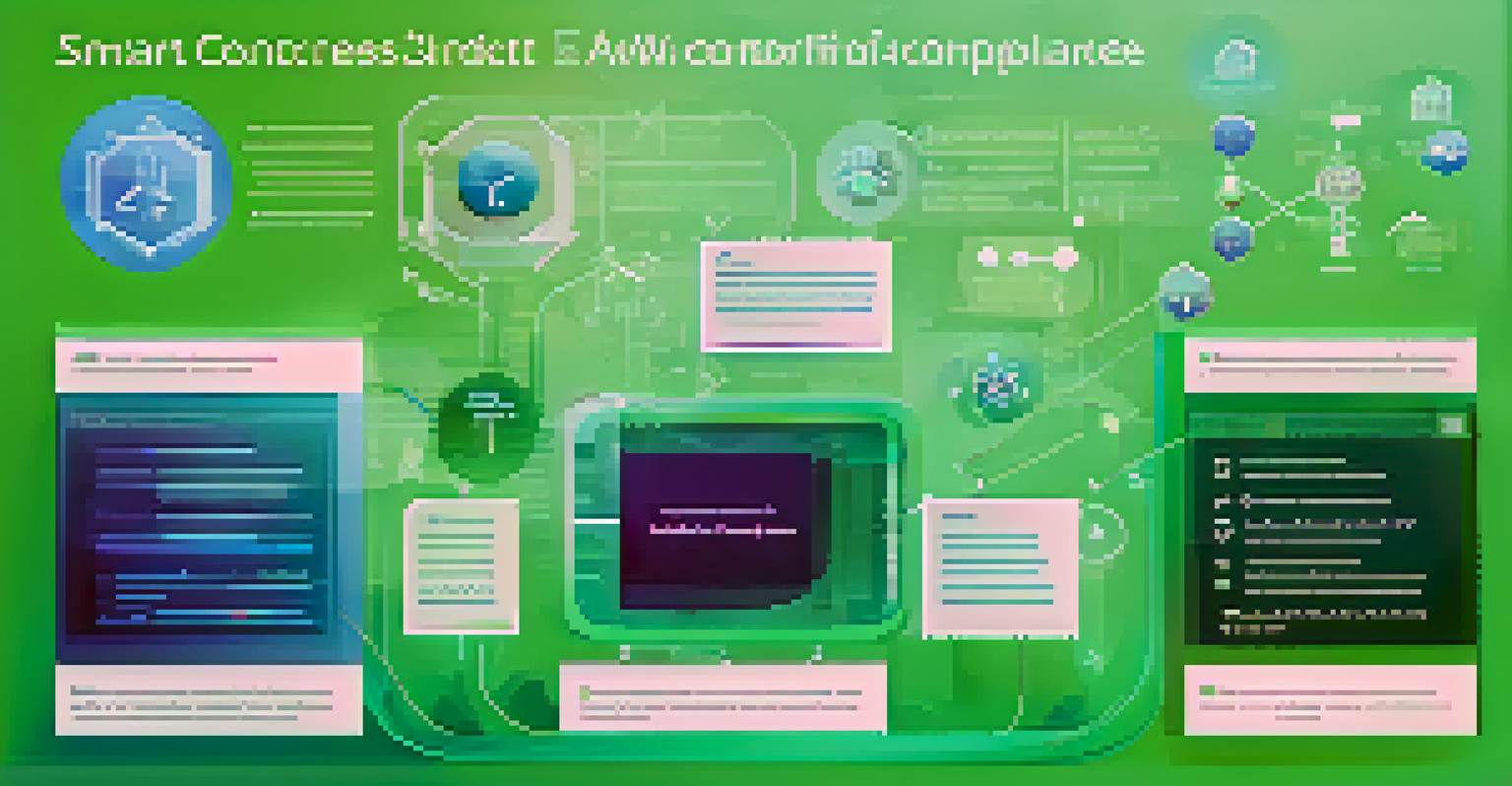Using Smart Contracts for Automated Compliance in Business

Understanding Smart Contracts and Their Role
Smart contracts are self-executing contracts with the terms of the agreement directly written into code. They operate on blockchain technology, ensuring transparency and immutability. This means once a smart contract is created, it cannot be altered, providing a reliable framework for various business transactions.
Smart contracts are not just a technological innovation; they are a new way of thinking about trust and transparency in business.
In a nutshell, smart contracts automate the execution of agreements when predetermined conditions are met. For example, if a company needs to pay a supplier upon delivery of goods, the smart contract can automatically release payment once the delivery is confirmed. This reduces the need for intermediaries, thereby cutting costs and speeding up processes.
As businesses increasingly turn to digital solutions, understanding smart contracts is essential. They not only enhance operational efficiency but also ensure compliance with regulations, making them a powerful tool for modern enterprises.
Benefits of Automated Compliance Using Smart Contracts
One of the standout benefits of using smart contracts for compliance is the reduction of human error. Manual processes can lead to mistakes that might result in non-compliance, whereas automated systems execute tasks consistently. Imagine a scenario where a compliance officer forgets a deadline; a smart contract will never forget—it will trigger actions based on the agreed-upon timeline.

Additionally, smart contracts provide real-time tracking and reporting capabilities. Businesses can easily monitor compliance status and generate reports that demonstrate adherence to regulations. This not only streamlines internal processes but also satisfies external audits and inspections.
Smart Contracts Automate Compliance
Smart contracts enhance efficiency by automating the execution of agreements, reducing the risk of human error and streamlining processes.
Moreover, the cost-effectiveness of these contracts is noteworthy. By eliminating the need for extensive paperwork and reducing administrative tasks, companies can allocate resources more efficiently, focusing on core business activities rather than compliance management.
How Smart Contracts Enhance Transparency and Trust
Transparency is a crucial aspect of compliance, and smart contracts deliver this in spades. Since all transactions are recorded on the blockchain, stakeholders can access a tamper-proof history of contract execution. This level of transparency fosters trust among parties involved, as everyone has visibility into the agreement's lifecycle.
The future of business is not about who can do more, but about who can do less—by automating compliance through smart contracts, organizations can focus on what truly matters.
For instance, in supply chain management, all participants can verify transaction details, such as shipment dates and conditions. This assurance helps prevent disputes and promotes collaborative relationships among suppliers, manufacturers, and retailers.
Furthermore, transparency reduces the likelihood of fraud. With immutable records on the blockchain, any attempts to alter contractual terms or misrepresent compliance are easily detectable, ensuring accountability at every level.
Real-World Applications of Smart Contracts for Compliance
Many industries are already harnessing the power of smart contracts for compliance. For instance, in the financial sector, institutions are using them to automate regulatory reporting and manage transactions securely and efficiently. This not only speeds up processes but also minimizes the risk of regulatory fines.
Another example is in the healthcare industry, where smart contracts help in managing patient consent for data sharing. By automating consent processes, healthcare providers can ensure they comply with privacy regulations while empowering patients with control over their information.
Transparency Builds Trust
The use of blockchain technology in smart contracts ensures transparency, allowing all stakeholders to access a tamper-proof history of contract execution.
These real-world applications showcase the versatility of smart contracts. Whether it’s finance, healthcare, or supply chain management, the ability to automate compliance tasks is proving to be a game-changer across various sectors.
Challenges in Implementing Smart Contracts
Despite their numerous advantages, implementing smart contracts does not come without challenges. One of the primary concerns is the technical complexity involved in creating these contracts. Businesses often require specialized knowledge to write and deploy smart contracts effectively, which can be a barrier for smaller companies.
Additionally, there’s the issue of regulatory uncertainty. As smart contracts operate in a rapidly evolving digital landscape, existing regulations may not be fully equipped to address their implications. Companies must navigate these uncertainties to ensure compliance while adopting new technologies.
Lastly, the integration of smart contracts with existing systems may pose difficulties. Organizations need to ensure that these contracts align with their current processes, which may require significant changes in operational workflows.
The Future of Smart Contracts in Business Compliance
Looking ahead, the future of smart contracts in business compliance appears bright. As more organizations recognize the benefits of automation and transparency, the adoption of smart contracts is likely to increase. This trend could lead to a shift in how businesses manage compliance, moving towards more proactive and efficient practices.
Furthermore, advancements in blockchain technology may simplify the creation and execution of smart contracts. As tools and platforms become more user-friendly, even smaller businesses will find it easier to implement these solutions, leveling the playing field in compliance management.
Challenges in Implementation Exist
Despite their benefits, businesses face challenges in implementing smart contracts, including technical complexity and regulatory uncertainty.
Ultimately, as the digital landscape continues to evolve, smart contracts are poised to play a pivotal role in shaping the future of compliance across various industries. Embracing this technology could empower businesses to operate more efficiently while adhering to regulations seamlessly.
Conclusion: Embracing Smart Contracts for a Compliant Future
In conclusion, smart contracts offer a revolutionary approach to automated compliance in business. With their ability to streamline processes, enhance transparency, and minimize human error, they represent a significant advancement for organizations aiming to stay compliant in an increasingly complex regulatory environment.
By adopting smart contracts, businesses can not only improve their operational efficiency but also build stronger relationships with stakeholders through trust and accountability. As we move forward, it’s clear that the integration of smart contracts will be crucial for companies looking to thrive in a digital-first world.

The journey toward automated compliance is ongoing, and embracing smart contracts is a proactive step toward a more efficient and compliant future. As technology continues to evolve, staying informed and adaptable will be key for businesses aiming to leverage these innovative solutions.